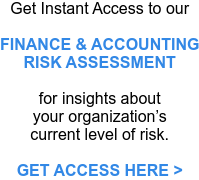
The current economic climate, combined with the fact that September is National Preparedness Month, has many of us thinking about how we can prepare for possible threats and business disruptions. This kind of strategic planning allows a business to approach a worst-case scenario with a growth mindset instead of fear – increasing the likelihood that your business will come out of a crisis stronger for having gone through it.
During a worst-case scenario, leadership must decide whether the organization will make the necessary adjustments needed to continue with business as usual or change how the company will operate. And while the conversation will undoubtedly include operational and capacity considerations, it is primarily a discussion about financial capabilities.
When COVID hit, some companies responded to supply chain disruptions by going outside of their existing supply channels to continue producing the same products and selling the same services. At the same time, others pivoted their operations to capitalize on new market opportunities – offering adjacent products and shifting their service approach. One example of shifting business operations was Unilever scaling back the production of skin care products in favor of ramping up their production of surface cleaners when demand spiked. Another example was Spotify making up for lost ad revenue by offering podcasts to listeners, signing deals with celebrities to provide original content that was exclusive to their platform.
Individual business circumstances, as well as specifics about the crisis itself, will determine which approach makes the most sense. However, regardless of the approach, your CFO will take the following strategic steps to prepare financially for a worst-case scenario:
Cash Flow Planning
When business activities are disrupted, cash flow planning is critical. Usually, it is advised that businesses keep at least a rolling 13-week cash flow forecast. However, when planning for a worst-case scenario, a CFO will likely expand it out to a 6, 12, or even an 18-month forecast.
Your CFO will aim to understand how the money will continue to move into and out of your business. They will analyze which of your current accounts would be likely to keep paying you on time and which would delay their payments or ask to change their payment terms. Once they get a sense of what cash inflow may look like, a CFO will do the same for cash outflows. Knowing which vendors you need to pay to keep operations running, your CFO can ensure that in any scenario, there is enough cash to satisfy your obligations to them.
Time is always of the essence when a disruptive event occurs. Often the organizations that respond the fastest have the best chance of minimizing impact and even finding growth opportunities in the chaos. A CFO will forecast multiple business disruption scenarios to make a financial preparedness plan that covers numerous scenarios and plan your strategic response for each scenario so that when one occurs, you can execute quickly. CFOs will also respond to uncertainty by leaning on financial best practices – planning to collect AR as soon as possible and avoid writing off outstanding invoices as bad debt to improve your cash position immediately.
Using a Decision Tree
CFOs think about possible triggers that could cause business disruption, such as:
- A pandemic
- Natural disasters
- Economic market downturns
- Changing governmental regulations
- The emergence of new technology
- A disruption in the competitive landscape
They then prioritize triggers based on their likelihood of occurring and formalize a plan that summarizes, “If this happens, we will do this.” A CFO will forecast the financial implications to your business model of each trigger and work cross-functionally to build financial models that represent the business impact of each scenario. Then your CFO will help you understand how your business should react and what types of barriers may exist to responding with an optimal growth mindset.
Adjusting Strategically
A CFO cannot plan for every possible scenario, but advanced strategic planning will provide the foundation to use in a crisis even when economic and political conditions change rapidly. During times of disruption and in the reporting periods immediately afterward, CFOs will compare business performance against the financial models you have forecasted and adjust strategy in response to these findings.
Remember, as businesses respond to market and industry disruptions, their goals must change as well. Be flexible in your evaluation of business objectives, key performance indicators (KPIs), growth milestones, and performance criteria. A CFO should welcome input from all areas of leadership to help reset goals and align various business teams around timely response scenarios.
Leveraging Available Resources
CFOs will proactively communicate with your bankers to determine which resources are available to your business. They can start a conversation that includes various planning components:
- Understanding how much flexibility is available on your current funding
- How likely obtaining additional funding would be during a market dip
- Exploring government incentives as they become available during a crisis
Well-connected CFOs can also draw on their network of business professionals to find additional resources to aid the business during a downturn or times of disruption. Trust their experience to work for your business, especially when the company is at its most vulnerable.
Get insights about your organization’s current risk level using our Finance and Accounting Risk Assessment Tool to improve your financial planning.






